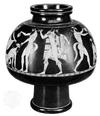- Hermes
-
/herr"meez/, n.1. the ancient Greek herald and messenger of the gods and the god of roads, commerce, invention, cunning, and theft. Cf. Mercury.2. Astron. a small asteroid that in 1937 approached within 485,000 mi. (780,000 km) of the earth, the closest approach of an asteroid ever observed.
* * *
The earliest center of his cult was probably Arcadia, where he was worshiped as a god of fertility. He was also associated with the protection of cattle and sheep. In Homer's Odyssey he appears as the messenger of the gods and the conductor of the dead to Hades. As a messenger he also became the god of roads and doorways and the protector of travelers. He was also the god of dreams. His Roman counterpart was Mercury. Hermes leading a satyr chorus, vase by Douris, 5th century BC; in the British MuseumBy courtesy of the trustees of the British Museum
Hermes leading a satyr chorus, vase by Douris, 5th century BC; in the British MuseumBy courtesy of the trustees of the British Museum* * *
Greek god, son of Zeus and the Pleiad Maia; often identified with the Roman Mercury and with Casmilus or Cadmilus, one of the Cabeiri. His name is probably derived from herma (see herm), the Greek word for a heap of stones, such as was used in the country to indicate boundaries or as a landmark. The earliest centre of his cult was probably Arcadia, where Mt. Cyllene was reputed to be his birthplace. There he was especially worshipped as the god of fertility, and his images were ithyphallic.Both in literature and cult Hermes was constantly associated with the protection of cattle and sheep, and he was often closely connected with deities of vegetation, especially Pan and the nymphs. In the Odyssey, however, he appears mainly as the messenger of the gods and the conductor of the dead to Hades. Hermes was also a dream god, and the Greeks offered to him the last libation before sleep. As a messenger, he may also have become the god of roads and doorways, and he was the protector of travellers. Treasure casually found was his gift, and any stroke of good luck was attributed to him; this conception and his function as a deity of gain, honest or dishonest, are natural derivatives of his character as a god of fertility. In many respects he was Apollo's counterpart; like him, Hermes was a patron of music and was credited with the invention of the kithara and sometimes of music itself. He was also god of eloquence and presided over some kinds of popular divination.The sacred number of Hermes was four, and the fourth day of the month was his birthday. In archaic art, apart from the stylized herms, he was portrayed as a full-grown and bearded man, clothed in a long tunic and often wearing a cap and winged boots. Sometimes he was represented in his pastoral character, bearing a sheep on his shoulders; at other times he appeared as the messenger of the gods with the kērykeion, or herald's staff (see caduceus), which was his most frequent attribute. From the latter part of the 5th century BC he was portrayed as a nude and beardless youth, a young athlete.▪ binary asteroidbinary asteroid whose eccentric orbit brings it near Earth. It was discovered in October 1937 by German astronomer Karl Wilhelm Reinmuth when it approached within about 742,000 km (461,000 miles) of Earth; announcement of this near passage occasioned some fear that it might collide with Earth. Hermes was subsequently lost and was not observed again until 2003. Radar observations of Hermes showed that it was actually two asteroids that orbit each other every 14 hours. The asteroids are 630 and 560 metres (2,070 and 1,840 feet) in diameter.* * *
Universalium. 2010.
